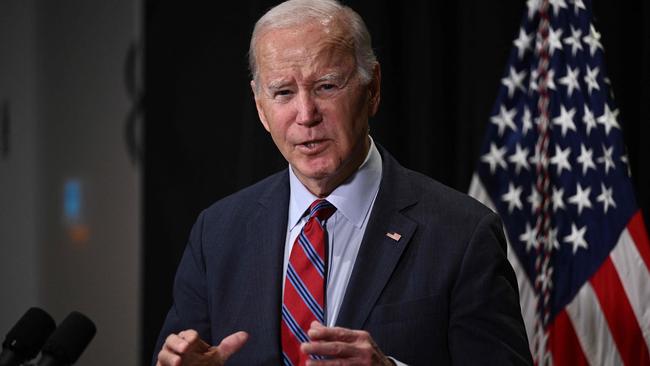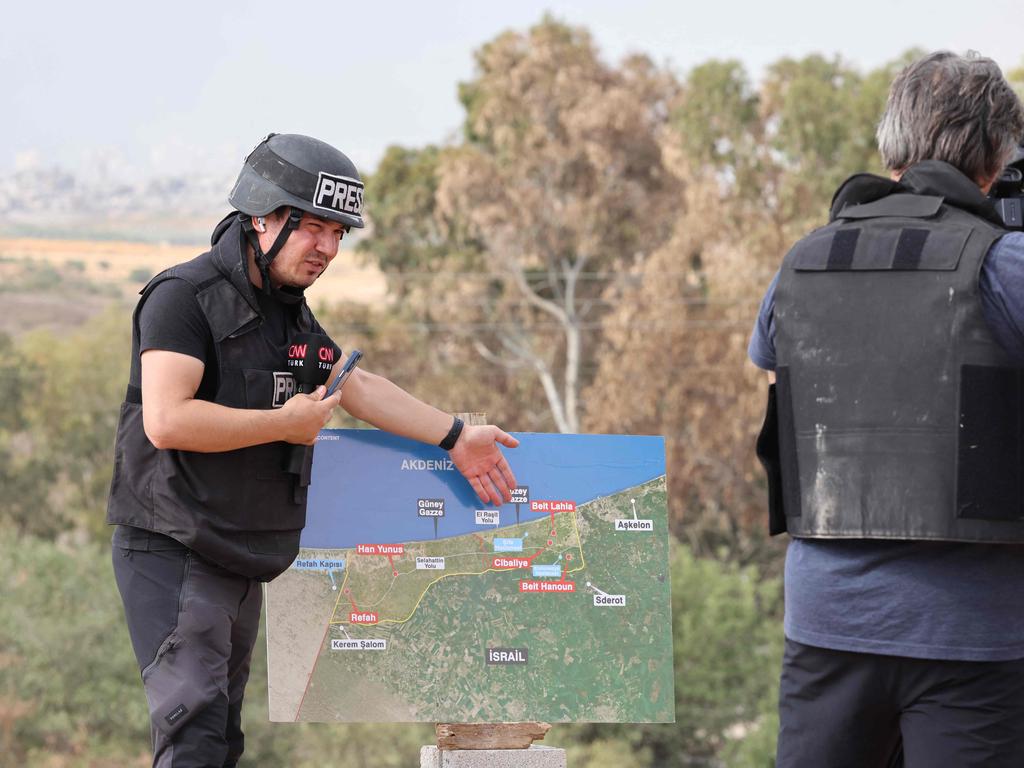For Joe Biden, the Israel hostage deal provides reprieve from political pressure
Most supporters of the US Democrats have praised the hostages-release agreement but many progressives still want the President to push for an extended ceasefire.

The deal between Israel and Hamas to secure a multiday pause in the fighting in Gaza starting on Friday to allow for the release of hostages, including Americans, provides President Joe Biden with a reprieve from the pressure of Democrats urging a full ceasefire. But only a temporary one.
Mr Biden was heavily involved in the agreement that came together after weeks of tense negotiations among the US, Qatar and Egypt and was approved by the Israeli cabinet following long deliberations.
He called Israeli Prime Minister Benjamin Netanyahu more than a dozen times, including the week, and was also personally in touch with other leaders as the talks progressed.
Negotiators raced to overcome last-minute sticking points that threatened to derail the effort before announcing a Friday start date, a day later than originally intended.
The deal is expected to lead to the release of 50 women and children held hostage by Hamas over four days, including three Americans, while providing a respite to the fighting and limitations on drone surveillance; the first group of hostages was released by Hamas Friday afternoon local time, Egyptian officials said.
The first group didn’t include Americans, but a White House official said the administration remained hopeful that Americans will be among the 50.
“It’s only a start but so far it’s gone well,” Mr Biden said.
Facing re-election next year, Mr Biden has been under pressure from progressive lawmakers and voters, particularly younger ones, in his party to push for a full ceasefire in the nearly seven-week conflict. Mr Biden has been reluctant to do so, pointing to the need to first win the release of hostages and warning that any extended pause could allow Hamas to regroup and commit more attacks.
The deal shows that Mr Biden is having some influence over the Israelis, who have resisted halts in fighting, and that he is making progress in an area that the White House has repeatedly named a priority: returning US hostages.
“I think this is going to be a real positive,” said Celinda Lake, a Democratic pollster who works on progressive causes and was part of Mr Biden’s 2020 campaign. The deal ties together freeing hostages with a pause in fighting, two issues that have deeply troubled voters.
“Who’s on the side of humanitarianism is up for debate by the different sides,” said Ms Lake, noting that Mr Biden has been painted as insensitive to the lives of Palestinians as the conflict has dragged on and images of the war have become ubiquitous on social-media feeds.
“And what this does is it puts everybody on the side of humanitarianism.”
Mr Biden’s response to the Middle East war has strained enthusiasm among parts of the coalition that helped him defeat former president Donald Trump in 2020. Polls consistently show that young people, who broadly supported him three years ago, dislike his approach to the war.
These surveys include a recent NBC News poll that found 70 per cent of voters between the ages of 18 and 34 disapprove of how Mr Biden is handling the conflict between Israel and Hamas. The same poll showed that 51 per cent of Democrats approve of how Mr Biden is approaching the war.
“I don’t think the wounds within the party are healed at all, and I can expect that it’ll probably get worse from here,” said Waleed Shahid, a Democratic strategist who has worked for leading progressive lawmakers and causes.
“You’re going to see more proof of concept for the progressive argument that there’s no military solution to this conflict.”
The Biden administration initially took a strongly pro-Israel response to the Hamas attacks, but became more nuanced as political pressure grew, and he has shown a willingness to criticise Israelis, particularly the West Bank settlers who have caused significant friction in the region. Mr Biden and the administration also have consistently said Israel has a right to defend itself against the Hamas attacks.
The hostage deal is the strongest sign to date that the Israeli government is heeding US calls to calibrate their military response. It raised expectations among some Democrats that the conflict could enter a new phase with a more targeted approach to Hamas and greater care taken to preserving civilian lives.
The 2016 presidential candidate Senator Bernie Sanders, in a New York Times op-ed, wrote that the reprieve was a “promising first step that we can build upon, and hopefully work to extend the pause”.
“This extended pause must not precede a resumption of indiscriminate bombing. Israel will continue to go after Hamas, but it must dramatically change its tactics to minimise civilian harm,” Senator Sanders wrote.
The suspension of intense fighting coincides with Biden’s effort to win approval in Congress for roughly $US14 billion ($21.3bn) in aid for Israel. Senator Sanders and other progressives have said any aid to Mr Netanyahu’s government must be conditioned on a halt to bombing and to settler violence in the West Bank and a commitment that Israel won’t occupy Gaza.
Nearly all leading Republicans, meanwhile, have been staunchly pro-Israel and critical of calls for a ceasefire. Few in the GOP have spoken out on the hostage deal. Former United Nations ambassador Nikki Haley, a 2024 presidential candidate, posted on X that she was “overjoyed that families may soon be reunited with their loved ones. But the world must demand more from Hamas. Why only 50 hostages?” She didn’t reference Mr Biden.
White House officials characterised the deal as one of patient diplomacy and expressed hope that it would inject a degree of calm into the region after intense fighting. But they were reluctant to frame the diplomatic breakthrough as far-reaching, noting the lack of trust between Hamas and Israel even as they hoped the release of some hostages would be a building block of future negotiations.
“We’re not going into this with hubris or arrogance or ultra-confidence. We’re grateful that we were able to get this deal secured,” said John Kirby, a spokesman for the National Security Council in an interview with CNN.
“It all now comes down to execution.”
Mr Biden, who is spending the US Thanksgiving holiday in Nantucket, held separate calls from the island with the leaders of Israel, Qatar and Egypt, who helped broker the deal.
The conversation with Mr Netanyahu included assurances that work will continue to secure the release of additional hostages, and Mr Biden stressed “the importance of maintaining calm” along the border with Lebanon and in the West Bank, according to the White House. To both Arab leaders, Biden stressed that he backs the creation of a Palestinian state, the White House said.
Pro-Palestinian activists applauded the release of hostages and pause in fighting, but said they believe it shows the benefit of their favoured approach of a full ceasefire.
On Friday, Mr Biden faced shouts of “Free Palestine!” and passed protesters while shopping and attending a tree-lighting ceremony in Nantucket.
“What this demonstrates is what those calling for a ceasefire have been saying for over a month, which is that diplomacy and negotiations is the only way out of this crisis,” said Eva Borgwardt, the national spokeswoman for IfNotNow, a Jewish group pushing for a full stop to the fighting.
Representative Ritchie Torres (Democrat, New York), who has supported Mr Biden’s pro-Israel policy, noted that the hostage deal represents a rejection of the unconditional ceasefire that some of his colleagues have backed. “If Israel had entered into a permanent, unconditional ceasefire, it would have no leverage to secure the release of the hostages,” Torres said.
The deal that Mr Biden helped broker, he said, is a “win, win, win” – because it releases some of the most vulnerable hostages, allows humanitarian aid to Gaza and keeps Israel focused on the larger goal of removing Hamas.
The Wall Street Journal







To join the conversation, please log in. Don't have an account? Register
Join the conversation, you are commenting as Logout